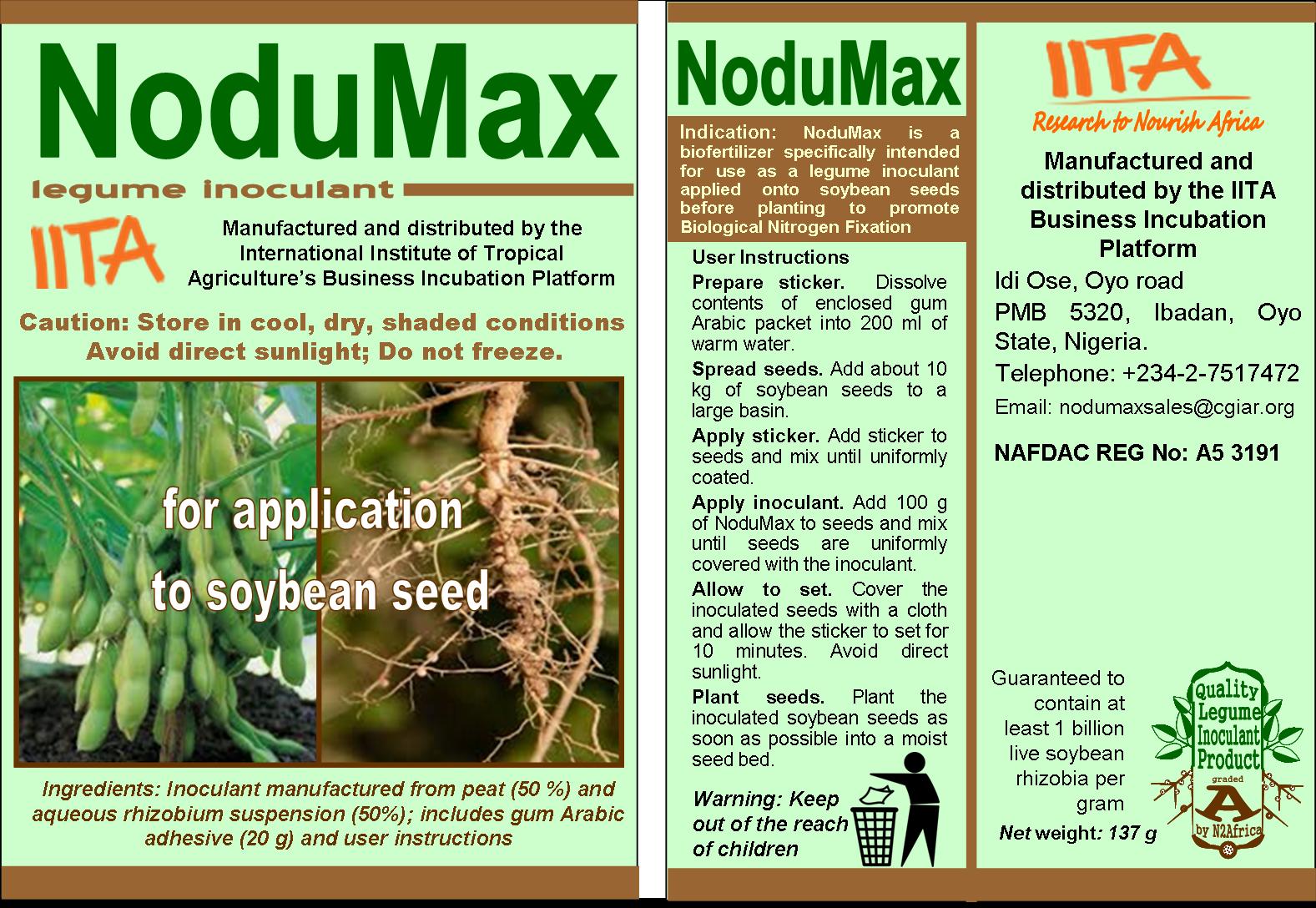NoduMax Legume Inoculant for Soybeans
Résumé
NoduMax is a peat based inoculant ensuring that soybean’s symbiotic rhizobium bacteria are present, resulting in improved root nodulation and high rates of biological nitrogen fixation (BNF). Nitrogen fixation eliminates the need for costly nitrogen fertilizers. NoduMax contains the industry-standard strain USDA 110 and includes a gum Arabic adhesive and user instructions, It is packed in 100 g packets sufficient for 10 to 15 kg soybean seed. Seeds are inoculated at a cost of about $18 per ha and result in yield increase of about 350 kg per ha worth $175. NoduMax is produced by the IITA Business Incubation Platform (BIP) in Ibadan, Nigeria and its distribution area includes Benin, Ghana, Nigeria and Togo. Manufacturers may apply to license NoduMax from the BIP. Distributor are eligible for quantity discounts.
En savoir plus sur la solution
NoduMax for Soybean is a solid inoculant product containing Bradyrhizobium japonicum strain USDA 110 "Tiny" originally obtained from BioNext of Wichita, Kansas, USA. The carrier is APT peat that is gamma irradiated. It is packed with finely ground gum arabic and user instructions in four languages (English, Hausa, Ibo and Yourba). Each unit of 100 g is sold for about $3.20 depending upon the quantity and current exchange rate. It is then assembled, stored and marketed in labeled cardboard boxes containing 25 units. Product descriptions are also available in French. The carrier material used in NoduMax is finely-ground peat obtained from American Peat Technologies (APT) of Minnesota, USA. It is purchased in one-ton super-sacks, repackaged into 50 g units, sterilized through gamma-irradiation by the commercial facility in Accra, Ghana and packed into 2.5 kg quantities (25 units) for distribution to agrodealers and farm cooperatives. This process removes all contaminants and allows for the production of a world-class, pure inoculant product.
Soybean is increasingly produced across Africa (about 1.3 million ha) and offers huge benefits in terms of protein sufficiency and value addition including animal feeds and processed and protein-enriched foods. Investing in soybean production, including inoculants, generates income for farmers, strengthens import substitution, contributes positively to the health and nutritional status of farming families, and improve soil fertility through the crop's large capacity for biological nitrogen fixation. Indeed, Africa is now poised for a soybean revolution and inoculation plays an important role in this growth.. For the first time, accompanying production technologies are now in place including high-yielding and disease-tolerant crop varieties, specially-blended fertilizers and weed management strategies that when employed in combination close yield gaps, taking yields to 2.5 + ton per ha.
NoduMax contains Bradyrhizobium japonicum strain USDA 110 at a density of at least 1 billion live cells per gram of inoculant. The quality is tested using drop plate counts on Congo Red Yeast Extract Mannitol agar. This is a pure product, but is also tested for microbial contaminants using Glucose-Peptone agar.
NoduMax is applied to soybean seed just before planting. First the gum arabic adhesive is dissolved in clean, hot water, applied to 10 to 15 kg of soybean seed, mixed to coat the seed exterior, the inoculant added, and the seeds mixed again until the inoculant appears as a fine brown powder uniformly distributed upon the seeds. Seeds should be planted shortly after application and protected from direct sunlight. This is referred to as the two-step method and results in the most uniform distribution on the seeds. An alternative, simpler method involves mixing the inoculant to the adhesive solution, and then applying them to the seeds but this technique tends to clump.
Commercialisation
Disponible dans le commerce
Images de la Solution
Institutions

Solutions d'Accompagnement
For inoculation of Nodumax to be successful, nitrogen availability and not another growth constraint must be limiting. For this reason it is important that the soybean varieties produced be tolerant of pests and diseases, especially Asian Rust. Also, basal fertilization of nutrients other than mineral nitrogen is important, particularly phosphate (e.g. Super Phosphate) or fertilizer blends specifically recommended for grain legumes (e.g. Sympal, NPK 0-23-16 +). Commercial farmers also rely upon pre-emergent herbicides to reduce field weeding operations.


